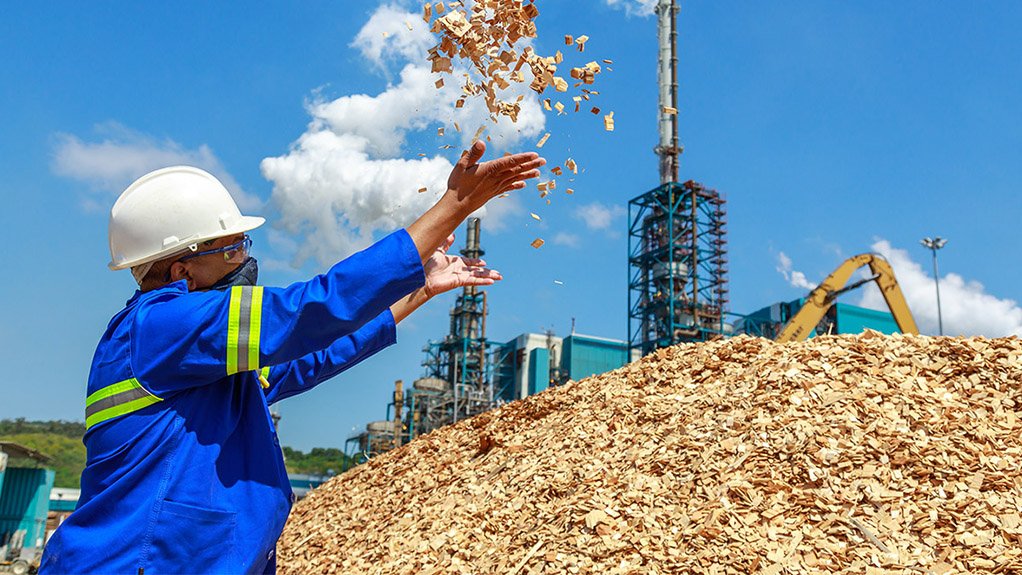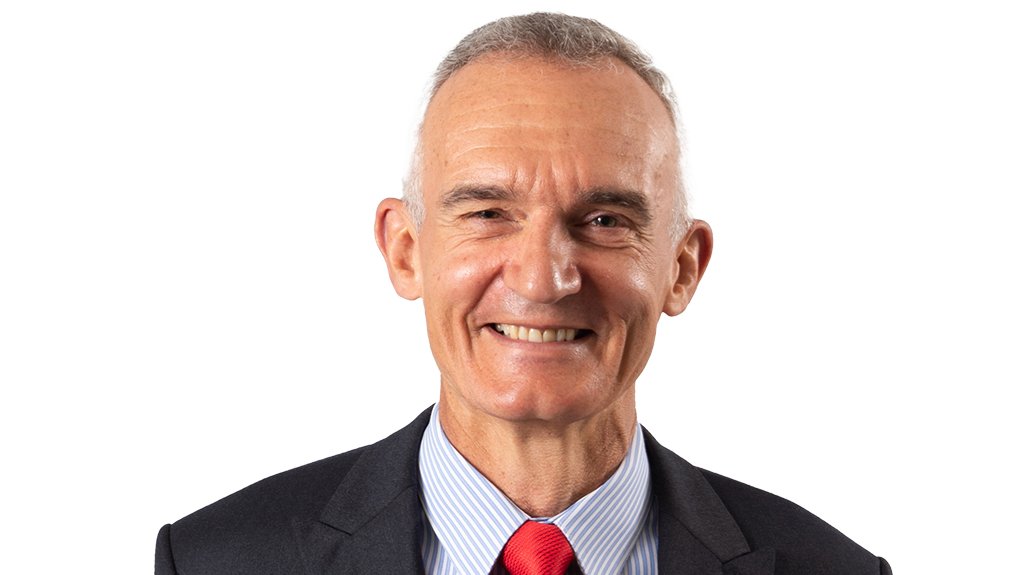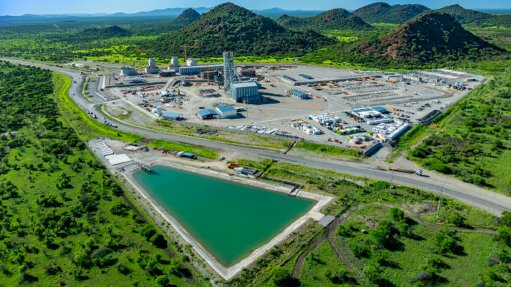Major player moving to secure power purchase agreements



SUSTAINABLE SAICCOR An expansion project at Sappi's Saiccor mill has significantly reduced its reliance on coal-based power
ALEX THIEL It is a priority for Eskom to invest in maintaining and increasing grid capacity as soon as possible so that renewable energy can be successfully deployed in South Africa
As South Africa’s energy crisis continues, global renewable resource company Sappi is actively engaging with independent renewable-energy producers to secure renewable energy as and when it becomes available, through power purchase agreements.
Buying renewable energy is one of three investment categories under the company’s South African decarbonisation and/or energy plan.
The second category includes energy efficiency investments, such as investing in additional turbine generators, which reduce Sappi’s overall energy intensity.
The third category involves investment in its own renewable-energy capacity, such as biomass boilers, the replacement of fossil fuels with biomass in some existing boilers, and solar and/or wind generation capacity.
“We are investigating the feasibility of further investments in our own renewable- energy capacity, but these are longer-term projects,” Sappi Southern Africa CEO Alex Thiel tells Engineering News.
While these investments will improve Sappi’s energy efficiency and reduce reliance on State-owned power utility Eskom and, consequently, coal-based power, the company will never be completely independent of Eskom, since the transmission of renewable energy (whether from independent power producers or produced by Sappi) is reliant on the national grid, he highlights.
“It is, therefore, a priority for Eskom to invest in maintaining and increasing grid capacity as soon as possible so that renewable energy can be successfully deployed in South Africa,” stresses Thiel.
Overall, Sappi’s South African operations are just under 50% energy self-sufficient, with some sites still 100% reliant on Eskom. The company can mostly manage its energy demand during loadshedding to keep critical equipment operational without impacting on output; however, unplanned Eskom power outages result in “havoc”, he explains.
“The consequent power dips and surges cause major disruptions to our operations and can shut our plants down completely, even though we have our own local power supply.
“Unstable operations with multiple stops and starts impact negatively on energy efficiency and significantly increase our operation’s overall energy intensity. It’s a vicious cycle, as more energy is needed to keep an unstable operation online,” explains Thiel.
Eskom-related interruptions cost Sappi about R200-million in the 2022 financial year.
Sappi is also facing logistical challenges, owing to the ongoing nonperformance of State-owned entity Transnet’s railway line south of Durban, in KwaZulu-Natal. The railway line was damaged by flooding in the province in April last year and is yet to be repaired.
This is in addition to the unreliability of the Durban-Johannesburg railway line, otherwise known as the ‘container corridor’.
The lack of reliable rail transport from Sappi’s Ngodwana mill, in Mpumalanga, to the Maputo port, in Mozambique, also remains a challenge.
“However, our excellent profits in 2022 enabled us to reset our balance sheet by substantially reducing our net debt, which is at its lowest level in more than 20 years. We also resumed our dividend. We are, therefore, very well positioned to meet any challenges in 2023 head-on,” states Thiel.
Last year, the company’s decarbonisation targets were validated as being aligned to the Paris Accord and the latest climate science by the Science Based Targets Initiative, a partnership between global nonprofit CDP, the United Nations Global Compact, global research organisation World Resources Institute and the World Wide Fund for Nature.
“Globally, we are committed to reducing our carbon emission intensity by 41.5% by 2030 (from a 2019 baseline). This means that we are actively seeking to replace fossil fuels and fossil-derived energy in our global operations with renewable energy,” highlights Thiel.
As a group, Sappi derived 54% of its energy from renewable sources last year.
“We have a dedicated capital allocation plan to achieve our decarbonisation targets and we have made some large capital investments over the past 12 to 18 months in Europe and South Africa, which will begin to fully deliver on their abatement potential in the next year or so,” he adds.
Sappi’s local operations are substantially energy intensive, but using diesel generators supports only 0.01% of its power needs.
Carbon emissions intensity is key to Sappi’s environmental, social and governance metric.
“However, we need to achieve these targets and our biggest challenge is our South African operations, which have the highest carbon intensity within our group. Delivery of the Just Energy Transition Plan is critical for South Africa and for us as a company, as we still need to purchase renewable energy, and grid capacity is required to complement our own investments,” says Thiel.
Article Enquiry
Email Article
Save Article
Feedback
To advertise email advertising@creamermedia.co.za or click here
Press Office
Announcements
What's On
Subscribe to improve your user experience...
Option 1 (equivalent of R125 a month):
Receive a weekly copy of Creamer Media's Engineering News & Mining Weekly magazine
(print copy for those in South Africa and e-magazine for those outside of South Africa)
Receive daily email newsletters
Access to full search results
Access archive of magazine back copies
Access to Projects in Progress
Access to ONE Research Report of your choice in PDF format
Option 2 (equivalent of R375 a month):
All benefits from Option 1
PLUS
Access to Creamer Media's Research Channel Africa for ALL Research Reports, in PDF format, on various industrial and mining sectors
including Electricity; Water; Energy Transition; Hydrogen; Roads, Rail and Ports; Coal; Gold; Platinum; Battery Metals; etc.
Already a subscriber?
Forgotten your password?
Receive weekly copy of Creamer Media's Engineering News & Mining Weekly magazine (print copy for those in South Africa and e-magazine for those outside of South Africa)
➕
Recieve daily email newsletters
➕
Access to full search results
➕
Access archive of magazine back copies
➕
Access to Projects in Progress
➕
Access to ONE Research Report of your choice in PDF format
RESEARCH CHANNEL AFRICA
R4500 (equivalent of R375 a month)
SUBSCRIBEAll benefits from Option 1
➕
Access to Creamer Media's Research Channel Africa for ALL Research Reports on various industrial and mining sectors, in PDF format, including on:
Electricity
➕
Water
➕
Energy Transition
➕
Hydrogen
➕
Roads, Rail and Ports
➕
Coal
➕
Gold
➕
Platinum
➕
Battery Metals
➕
etc.
Receive all benefits from Option 1 or Option 2 delivered to numerous people at your company
➕
Multiple User names and Passwords for simultaneous log-ins
➕
Intranet integration access to all in your organisation


















